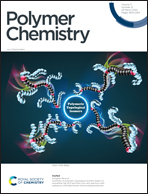Facile preparation of long-chain aliphatic polycarbonates containing block copolycarbonates via one-pot sequential organic catalyzed polymerization of macrocyclic carbonates and trimethylene carbonates†
Abstract
The synthesis of block copolycarbonates is still a challenge because of the fast occurrence of intra- and intermolecular transesterification reactions during ring-opening polymerization. In this context, we report the synthesis of block copolycarbonates by delicately designing and taking advantage of the differences in polymerization between macrocyclic carbonates and small cyclic carbonates. Firstly, four macrocyclic carbonates containing different numbers of methylenes are prepared and subsequently polymerized by using a TBD/alcohol system, which shows an efficient activity at elevated temperatures and inefficient performance at room temperature. Inspired by this result, block copolycarbonates can be easily prepared by the sequential addition of monomers, polymerizing macrocyclic carbonates at 70 °C and subsequently polymerizing TMC at room temperature, as evidenced by 1H NMR and 13C NMR spectroscopy and DSC characterization. In particular, changing the polymerization temperature or monomer addition methods, such as polymerizing two monomers at 70 °C by sequential addition or polymerizing TMC at room temperature and subsequently polymerizing macrocyclic carbonates at 70 °C, only leads to the formation of random copolymers. Besides, the block copolycarbonates would gradually transform into random structures with an increase in reaction time due to the significantly increased rate of transesterification. These results highlight the key role of reaction conditions such as reaction temperature, monomer addition sequence and reaction time in the formation of block copolycarbonates.



 Please wait while we load your content...
Please wait while we load your content...